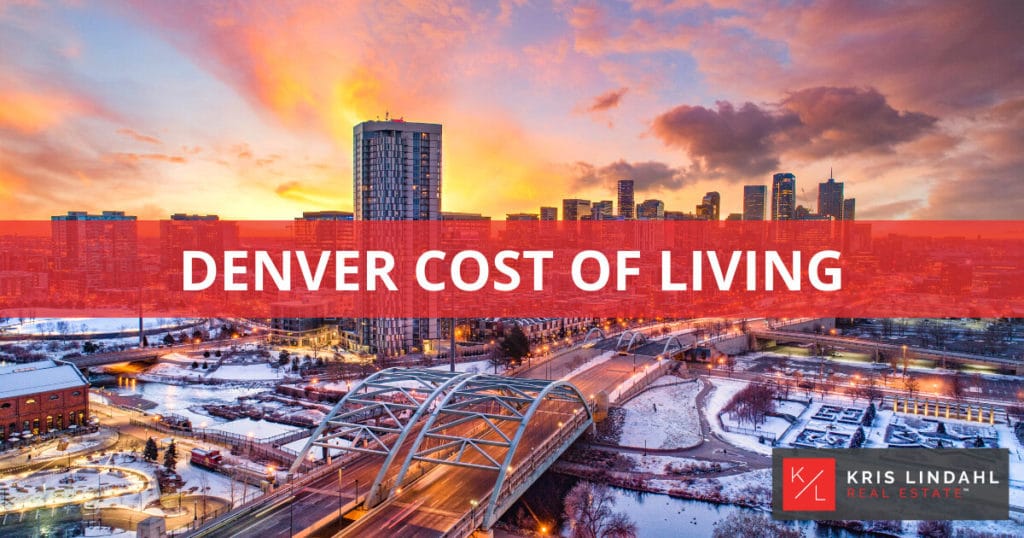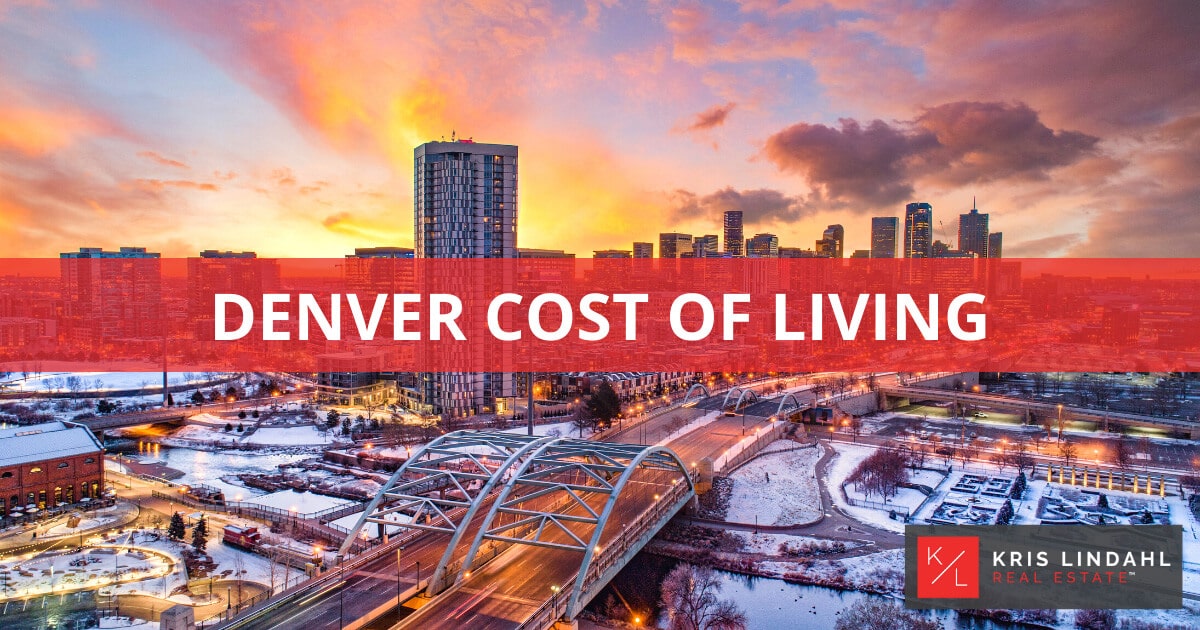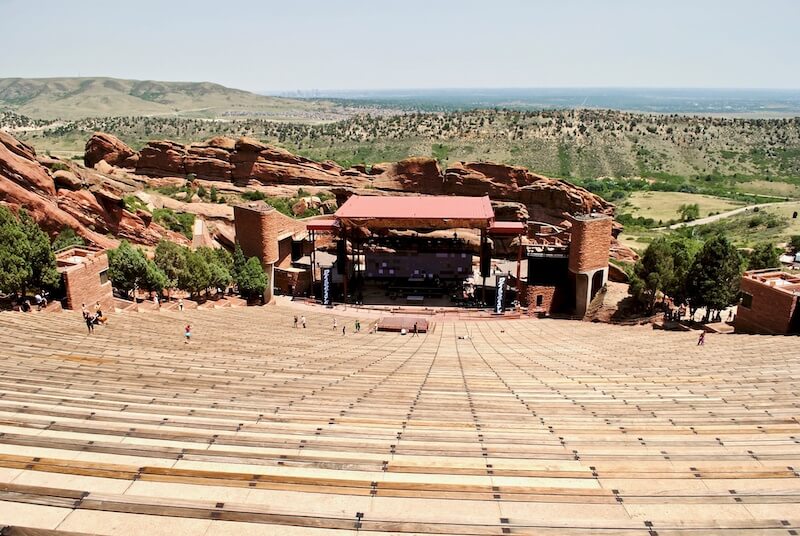
Cost of Living in Denver: What to Include in a Monthly Budget

How Much Does it Cost to Live in Denver?
With all that the city of Denver has to offer, there are plenty of people looking to relocate to Colorado’s largest city. This has turned Denver real estate into a sought-after gem, driving the average cost of living up 12.5% higher than the national average.
A thorough understanding of an area’s cost of living is important when considering a new city to call home. Keep reading for an in-depth explanation of the many factors that contribute to the cost of living in Denver, Colorado.
Table of Contents
Cost of Housing in Denver
With the droves of people flocking to Denver for its gorgeous outdoor scenery, nearby national parks, and active winter sports scene, supply and demand have skyrocketed the city’s cost of housing.
#hw-pillar-chart-housing-denver#
Some of the city’s nearby neighbors have significantly less expensive housing than the state’s largest city. For example, homes in Aurora, Colorado, are on average 23% more affordable than in Denver. Likewise, Colorado Springs and the Commerce City community both border Denver, and their housing costs are 32% and 17% less expensive than Denver, respectively. These cities all offer homes similar in size and composition to the properties typical of Denver but at a much lower price point.
Median Home Price in Denver
Recently, the median home prices in Denver have reached record highs. The average sale price for a Denver single-family home is close to $600,000. Denver condos, townhomes, and other attached residences are not far behind, with the average cost being close to $400,000. This increase is due in no small part to the low housing inventory in the city. With so many prospective homebuyers, Denver’s desirable properties are at a premium.
There are a variety of neighborhoods within Denver, so prospective homebuyers have plenty of opportunities to find the community best suited to their lifestyle and budget. Windsor and Dayton Triangle are both neighborhoods on the affordable end of the spectrum. The majority of homes for sale in these areas are condos and townhomes selling for between $200,000 and $400,000. Most of these properties boast at least two bedrooms and two bathrooms.
Neighborhoods like Washington Park, Washington Park West, and Belcaro are some of the most expensive neighborhoods in Denver. These areas offer prospective buyers an endless amount of options when it comes to upscale detached houses, condos, townhouses, and new construction homes in Denver. Properties in these neighborhoods are known to sell for anywhere from $500,000 to over $5M for Denver’s most luxurious homes.
Median Rent in Denver
Rent rates in Denver are more expensive than both the state and national average. The typical studio rent in Denver costs close to $1,100 monthly. Similarly, one- and two-bedroom apartments in the city rent, on average, anywhere from $1,200 to $2,000 per month. When it comes to three- and four-bedroom rentals, the monthly costs shoot up to $2,500 and beyond.
Renters looking to save some coin can look at neighborhoods like Ruby Hill, Sun Valley, or East Colfax. These are among the most affordable neighborhoods for Denver renters to seek housing. In these areas, the average monthly rent for a one-bedroom apartment might be less than $1,000.
At the opposite end of the spectrum, neighborhoods like Cherry Creek, University, and Washington Park are among Denver’s most expensive communities for renters. The cost of studio apartments in these areas typically starts between $1,500 and $2,000 per month.
Cost of Utilities in Denver
 Luckily for Denver residents, the city’s moderate climate keeps outrageous utility bills at bay for the most part. The city’s average electric bill hovers around $80, well below the national average energy bill of $107 per month.
Luckily for Denver residents, the city’s moderate climate keeps outrageous utility bills at bay for the most part. The city’s average electric bill hovers around $80, well below the national average energy bill of $107 per month.
Denver utility bills typically come to a little over $200 per month. This amount includes electricity, heating, air conditioning, water, and garbage services.
Internet and cable in Denver can cost anywhere from $29 to close to $170 per month. Residents have several options to choose from when it comes to internet and cable plans and providers.
Cost of Food in Denver
Grocery and meal prices in Denver vary widely. They are generally dependent on whether the resident is cooking their own meals, eating takeout, going to a sit-down restaurant, or picking up fast food on the way home from work.
Cost of Groceries in Denver
A recent study by the U.S Department of Agriculture states that the average American spends 6% of their monthly budget on groceries. Denver residents can rejoice that the cost of groceries in the city is 2% less than the national average. Grocery staples like bread, milk, and eggs are all slightly less expensive than the averages of their national counterparts.
#hw-pillar-chart-food-denver#
There are also several grocery stores in the city that offer high-quality grocery staples at a discount price. For example, Pete’s Fruits and Vegetables, located in Hilltop, provides a wide variety of budget-friendly staples. Similarly, Park Hill Supermarket provides essentials that help Denver residents stock their pantries without breaking the bank. Park Hill Supermarket offers the standard grocery fare in addition to delicious international options, all at a reasonable cost.
Cost of Eating Out in Denver
 Denver is home to a vast selection of restaurants, from upscale dining to casual eats and fast food.
Denver is home to a vast selection of restaurants, from upscale dining to casual eats and fast food.
When dining out in Denver, the cost of an average lunch or dinner at a casual restaurant is typically around $16 per person. This is without appetizers, alcohol, or dessert. On average, breakfast in Denver tends to cost less than lunch and dinner.
A few local favorites for casual eats are Steuben’s Uptown, Cart-Driver, and BriDer. These establishments are ideal for meeting friends for drinks, casual nights out, or watching a Denver Broncos game.
In contrast, fine dining restaurants in the city cost upwards of $70 or more for a three-course meal. Some of the city favorites include:
- Mizuna: Cozy and private fine dining in the Capitol Hill neighborhood.
- Beckon: Seasonal menus with front-row seats to the chef’s station.
- Ocean Prime: Known for their steak, seafood, and excellent wine pairings.
For those residents looking to get a quick meal to go, plenty of fast food options are available in Denver. Some of the most popular include Crown Burgers, Del Taco, and Chik-fil-A.
Cost of Transportation in Denver
The average adult in Denver will spend close to $5,000 per year on transportation. Households with two working adults and one child should plan to spend at least $11,000 annually on transportation, and sometimes more.
#hw-pillar-chart-transit-denver#
Denver’s public transportation riders are served by Regional Transportation District, aka RTD Denver. A single local ride costs $3, while a regional ride costs $5.25. Daily, weekly, and monthly passes are available. Denver is also served by most major ride-sharing apps. The average cost of a ride-share in Denver is $0.83 per mile.
For those planning on using personal vehicles to drive in Denver, the average cost of car insurance in the city is $91 per month, significantly higher than the statewide insurance cost of $72.
Cost of Health Care in Denver
 As premiums for health insurance plans continue to increase across the country, Denver is no different. The cost of health care in Denver is currently 5% higher than the national average. The average full-time Denver employee pays close to $1,500 out of pocket per year for insurance after employer contribution. For a household with two adults and one child, that cost will almost triple.
As premiums for health insurance plans continue to increase across the country, Denver is no different. The cost of health care in Denver is currently 5% higher than the national average. The average full-time Denver employee pays close to $1,500 out of pocket per year for insurance after employer contribution. For a household with two adults and one child, that cost will almost triple.
Without insurance, the average cost to spend a day in a Denver hospital is close to $3,000. Visits to the doctor, the dentist, and the optometrist are all, on average, over $100 per visit. The typical cost of a prescription without insurance is close to $500.
It’s relatively expensive to keep Denver’s four-legged friends healthy, too. In Denver, a visit to the vet costs, on average, close to $60. Thankfully, there are plenty of low-cost vet clinics operating in Denver. MaxFund Wellness Center in Lincoln Park, for example, offers exams for under $50 and spay and neuter operations for under $200. To help offset the cost of vet treatments even more, there are plenty of pet insurance companies serving Denver. Some of the most highly-reviewed pet insurance companies include PetsBest, Hartville Pet Insurance, and Petplan. These organizations offer highly customizable plans that start at $20 and can cost as much as $100 monthly.
Cost of Child Care in Denver
In Denver, child care comes with a hefty price tag. Colorado is the eighth-most expensive state for child care, and Denver is one of its most expensive cities. On average, the cost of care for an infant in Denver is over $15,000 annually. To put this in perspective, the average annual cost of housing in Colorado is less than $14,000. The average yearly cost of state college tuition in Colorado is under $10,000.
#hw-pillar-chart-childcare-denver#
A private child care worker in Denver can expect to make close to $17 per hour, equaling a gross weekly salary of almost $600. These prices aren’t set in stone—a parent or caretaker of a young child in Denver can expect to pay anywhere between $12 and $25 per hour for a nanny. Requirements like needing a driver’s license or first aid certification will drive up the hourly rate of child care. In contrast, only needing part-time assistance drives the hourly rate down.
Private nannying is not the only option for child care in Denver. There is also a wide selection of child care centers in the city. For example, at Sunflower Hill Child Care, toddlers and preschool-age children are cared for from two to four days per week. Costs range from $700 to close to $2,000 per week for full-time care.
Cost of Entertainment in Denver
 There is no shortage of things to do at a reasonable price in Denver, Colorado. The city is home to plenty of theaters, concert venues, public parks, and more that keep its residents happy and entertained.
There is no shortage of things to do at a reasonable price in Denver, Colorado. The city is home to plenty of theaters, concert venues, public parks, and more that keep its residents happy and entertained.
On average, a night at the movies for two costs $25. Some of the movie theaters in Denver include the Regal, AMC Dine-In in Cherry Creek, and Harkins Theatres.
Tickets to the theatre in Denver can cost $200 or more. Some of the major playhouses within the city include the Adams Mystery Playhouse, the Denver Center for Performing Arts, and the Curious Theatre Company. All of these venues are home to a steady stream of talented performances.
Those looking for a musical experience can get their fix at the Red Rocks Amphitheatre. Stars of all kinds have graced this legendary stage, and tickets typically cost concertgoers $100 or more.
Sports lovers can enjoy plenty of activity in Denver, with the city being home to the Denver Broncos NFL team, the Colorado Avalanche of the NHL, the Denver Nuggets of the NBA, and the Colorado Rockies of the MLB. The Broncos draw a large crowd of loyal fans to Empower Field and Mile High, and tickets generally start between $50 to $100.
Lastly, shopping is a form of entertainment for many Denver residents. The sales tax in Denver is 4.81%, and there are plenty of shopping malls and centers around the city catering to all markets.
Average Salary and Median Household Income in Denver
In Denver, the average household income is over $75,000 per year. This is over $10,000 more than the U.S. average household income.
On average, a single Denver resident needs to bring home $60,000 or more to live comfortably in the city. This is equal to an hourly rate over $30. With this income, the average Denver resident can afford to rent a one-bedroom apartment in the city while keeping up with utilities, groceries, and transportation.
#hw-pillar-chart-salary-denver#
The hourly living wage in Denver is $17 per hour, translating to a salary of roughly $35,000. This wage affords housing, food, and essentials for the typical Denver resident. However, this amount does not include disposable income to save or splurge.
The minimum wage in Denver is $14.77. This is over double the federal minimum wage. The unemployment rate in Denver is 6.3%, slightly higher than the national average of 5.4%, and the income tax rate is 4.63%.
Some of the most popular industries to work in the Denver economy include Administrative, Education, and Scientific and Technical Services. Together, these industries employ over 100,000 people in the city. The highest-paying industries in Denver, on the other hand, include Mining, Agriculture, and Oil & Gas Extraction. Employees in these industries make, on average, over $100,000 per year.
Find the Perfect Home in Denver, Colorado
Denver offers its residents mild weather, four distinct seasons, and a colorful restaurant landscape. The strong Denver economy, lively sports following, and energetic outdoor lifestyle make the city a unique option for prospective homebuyers. For prospective homebuyers willing and able to fit the city’s high cost of living into their budget, Denver may be the perfect city to call home.
#hw-pillar-cta-bottom-denver#



